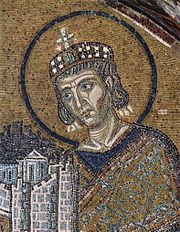Saint Constantine (27 February c. 272 – 22 May 337), commonly known in English as Constantine I, Constantine the Great, was Roman Emperor from 306, and the undisputed holder of that office from 324 until his death in 337. Best known for being the first Christian Roman Emperor, Constantine reversed the persecutions of his predecessor, Diocletian, and issued (with his co-emperor Licinius) the Edict of Milan in 313, which proclaimed religious toleration throughout the empire.
The Byzantine liturgical calendar, observed by the Eastern Orthodox Church and some Churches in union with Rome, lists both Constantine and his mother Helena as saints. In the West, he is revered under the title "The Great" for his contributions to Christianity. Constantine also transformed the ancient Greek colony of Byzantium into a new imperial residence, Constantinople, which would remain the capital of the Byzantine Empire for over a thousand years. He is a saint or among Eastern Orthodox, Oriental Orthodox and other Christians.
